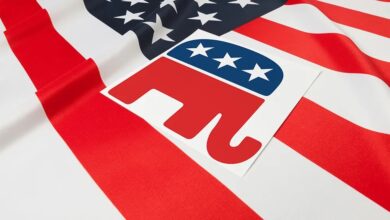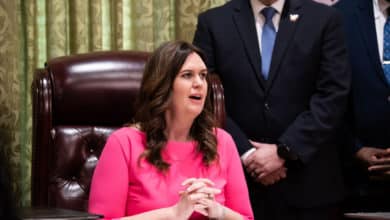By Conduit For Action
 Act 1002 of 2021 which bans mask mandates by any state or local entity was declared unconstitutional in its entirety by Circuit Judge Timothy Fox. He issued a preliminary injunction against enforcement of Act 1002. The injunction will remain in force pending either a further order by Judge Fox or decision on appeal by the Supreme Court.
Act 1002 of 2021 which bans mask mandates by any state or local entity was declared unconstitutional in its entirety by Circuit Judge Timothy Fox. He issued a preliminary injunction against enforcement of Act 1002. The injunction will remain in force pending either a further order by Judge Fox or decision on appeal by the Supreme Court.
Judge Fox listed several reasons he thinks Act 1002 is unconstitutional. The judge ruled the ban violates equal protection by discriminating against students in public schools and violates the separation of powers by usurping powers of the Governor, county judges, and the courts.
Act 1002 applies the mask mandate ban to: “A state agency or entity, a political subdivision of the state, or a state or local official”.
WHAT IS THE LIKELIHOOD THE JUDGE WILL BE REVERSED ON APPEAL?
Judge Fox is clearly wrong about Act 1002 violating equal protection and wrong about the act violating the powers of the Governor and county judges. We also think there is a good argument for sustaining the mask mandate ban even as it applies to courtrooms.
What follows is a discussion of why the judge is wrong on each of the four areas he addressed.
- Does It Violate the Governor’s Emergency Powers?
Judge Fox’s opinion: A.C.A. §12-75-107, as amended by Act 403 of 2021, legislatively delegates emergency declaration and emergency action authority to the Governor, as the chief executive officer of the state.
Act 1002 of 2021, facially violates the separation of powers doctrine as it usurps the authority specifically granted to the Governor with respect to declarations of emergency as set forth in A.C.A. §12-75-107 (as modified by Act 403 of 2021.)
This judge’s argument concerning the Governor’s emergency powers is baseless and should be reversed.
The emergency powers exercised by the Governor are not based on some grant of power to the governor by the constitution. The powers only exists in a law passed by the legislature. To adopt the judges view you would have to say that once a law gives power to the governor, the power can never be diminished by a future law. The governor’s emergency power is based merely on a law and that law can be amended or repealed by law and it can be limited by other laws. There is no conflict between the laws because, under the rules of statutory construction in the Arkansas Code, Act 1002 is the latest state of the law with regards to emergency powers.
Act 1002 does not usurp powers under A.C.A. §12-75-107. Act 1002 is the latest statement of the law.
There is no separation of powers issue concerning the ban’s limit on a governor’s emergency powers provided by law. If there is any separation of power issue concerning emergency powers it is the reverse – Is the grant of emergency powers by law an unconstitutional delegation of legislative power to a governor?
- Does It Violate the Power of County Judges?
Judge Fox’s opinion: Act 1002 of 2021, as enacted, facially violates the separation of powers clause in that it attempts to usurp the constitutional authority granted to county judges over county buildings and property.
Act 1002 of 2021, as enacted, facially violates the separation of powers clause in that it attempts to usurp the constitutional authority granted to county judges over county buildings and property.
This argument is based on Amendment 55, §3 of the Arkansas Constitution which says county judges “have custody of county property…” The question is whether being a custodian of county property gives a county judge the power to ignore state laws on county property? It does not.
Before we look at custodial powers, it is important to read all of Amendment 55. Section 1 of Amendment 55 begins:
(a) A county acting through its Quorum Court may exercise local legislative authority not denied by the Constitution or by law.
Under Amendment 55 the legislative power of the county cannot conflict with the Constitution or with a law passed by the legislature. The legislature by law (Act 1002) denied the county the authority to impose a mask mandate. Under application of Section 1 (a) of Amendment 55 the legislative power of the county cannot include mask mandates. Is Judge Fox claiming a county judge has his own legislative power independent of the quorum court?
Judge Fox’s opinion concerning county judges hinges on what it means to be the custodian of county property. Being custodian gives the county judge discretion over the use of the property. If Judge Fox’s view were to be adopted then in essence a county judge would have a kingdom were no state laws apply.
Here is an example. State law says a county judge’s role as custodian of property includes the right to dispose of property but adds that disposal must be “in the manner and procedure provided by law for the disposal of county property by the county court.” (A.C.A 14-14-1102 (b)(3)(A) If Judge Fox’s broad view of the role of a custodian were applied here a a judge could dispose of county property any way the judge wants without restriction by law or ordinance..
By extension the court opinion would view other laws that impose restrictions on county property as invalid. It would mean a county judge could ignore all state (and county) health and safety laws and ordinances. It would let a county judge ignore regulations concerning clean water in the building, sewage disposal, building safety, construction standards, etc.
To further illustrate this point, let’s push the example to the ridiculous. Would anyone argue a county judge could use a county building as a bordello, a casino, a sanctuary for recreational marijuana, or an unlicensed abortion clinic in violation of state law? Of course not. The county judge is a custodian not a warlord.
Being the custodian of property does not give a county judge the authority to ignore law, including Act 1002.
- Does It Violate Equal Protection Rights of Public School Students?
Judge Fox’s opinion: Act 1002 of 2021, as enacted, facially violates the equal protection provisions of Article 2 of the Arkansas Constitution, in that it discriminates, without a rational basis, between minors in public schools and minors in private schools.
First, prohibiting a mask mandate in public school has nothing to do with a student’s rights. Act 1002 does not prohibit a public school student from wearing a mask. Act 1002 limits the actions of the school board not the right of a student.
Second, even if the mask mandate ban was to be interpreted as discrimination (which it is not) the judge asks what is the “rational basis” for treating them differently? Clearly the rational basis is based on public schools being governmental entities run in accordance with government rules. Private schools and home schools exist because some parents do not want the government to be in charge of the education of their children and in the case of religious schools, they want to be guided by the standards of their religion instead of the popular secular notion of the day. The state does not mandate a child to attend a private school or home school; it is an option.
If a public school student is discriminated against, it is not because the school doesn’t have a mask mandate, it is because they can’t have the religious education found in a private religious school or the educational freedom and flexibility of a home school.
The idea that public school students are discriminated against by laws applicable to public shools does not produce a logical result. If the ban on schools imposing a mask mandate must fall, then most other school laws must also fall. There are hundreds, if not thousands, of public school laws which restrict and control every aspect of public schools from the establishment of public schools down to the everyday operations of the schools. These standards include many health-related laws, such as immunization, conduct of school nurses, how schools handle students with diabetes or other health conditions, how the schools respond to sports injuries, requirements for teaching various health curriculum, etc.
If applying a restriction to a public school is somehow discrimination the response would have to be either: 1. Slash school laws to match the limited regulation of home schools; or 2. Impose a massive increase in government power and control over private schools, including religious schools, and home schools.
But again, there is no discrimination. Act 1002 does not prohibit a public school student from wearing a mask.
- Does It Violate the Supreme Court’s Control of Courts?
Judge Fox’s opinion: Amendment 80, §4 to the Arkansas Constitution, states, in part, “The Supreme Court shall exercise general superintending control over all courts of the state…”
Act 1002 of 2021, as enacted, facially violates the separation of powers doctrine in that it attempts to usurp the exclusive superintending authority concerning the procedure and conduct in the courts of the state that is granted to the Arkansas Supreme Court.
The Supreme Court has superintending control over the courts but we have not found case law to answer whether the court’s power is so broad as to invalidate a general ban on mask mandates. What is the extent to which the Supreme Court can ignore state laws that might apply in court rooms?
For example, does the ban on smoking (A.C.A, § 20-27-1804) apply in a courtroom because it is prohibited by a state law passed by the legislature or could the Supreme Court ignore the ban on smoking based on its superintending control?
Opponents of the ban on mask mandates would likely claim a ban on smoking is different from Act 1002 by saying the law on smoking is directed at citizens whereas the Act is directed at limiting the power of governmental entities, such as the courts. But there really is no distinction between the two bans. The smoking ban and the mask mandate ban are essentially the same because in banning smoking the law is also saying governmental entities are banned from authorizing smoking contrary to the law.
If the court were to allow the smoking ban but not the mask mandate ban, then couldn’t the legislature just restate the same mask mandate ban by saying something like, “A person is not required to wear a mask….” Same ban, same effect just stated differently.
If the court decides to extend the definition of supervisory control to prohibit laws such as a mask mandate ban and a smoking ban then you must ask what if any state laws apply in court rooms.
We also note that the Supreme Court has not issued an order regulating masks in courtrooms and the Supreme Court followed the emergency rules of the Health Department as applied to COVID-19 protocols.
The meaning of the Supreme Court’s superintending control can only be answered upon appeal of Judge Fox’s order.
CAN PART STAND IF PART FALLS
If application of the ban to courtrooms is found to be a violation of Supreme Court power does that mean the ban cannot be applied to other state and local entities?
Act 1002 does not include a severability clause in its text but a severability clause applies anyway by virtue of A.C.A. 1-2-205 which says:
The provisions of each and every act enacted by the General Assembly after July 24, 1973, are declared to be severable and, unless it is otherwise specifically provided in the particular act, the invalidity of any provision of that act shall not affect other provisions of the act which can be given effect without the invalid provision.
Regarding severability the court has said:
[t]he constitutional and unconstitutional provisions may even be contained in the same section, and yet be perfectly distinct and separable, so that the first may stand, though the last fall. The point is, not whether they are contained in the same [***29] section, for the distribution into sections is purely artificial, but whether they are essentially and inseparably connected in substance. HN21 If, when the unconstitutional portion is stricken out, that which remains is complete in itself, and capable of being executed in accordance with the apparent legislative intent, wholly independent of that which was rejected, it must be sustained. . . . If a statute attempts to accomplish two or more objects, and is void as to one, it may still be in every respect complete and valid as to the other. But if its purpose is to accomplish a single object only, and some of its provisions are void, the whole must fail, unless sufficient remains to effect the object without the aid of the invalid portion. And if they are so mutually connected with and dependent on each other, as conditions, considerations, or compensations for each other, as to warrant the belief that the Legislature would not pass the residue independently, then, if some parts are unconstitutional, all the provisions which are thus dependent, conditional, or connected must fall with them.[i]
We will have to watch and wait how the Supreme Court interprets Act 1002.
[i] Thurston v. Safe Surgery Ark., 2021 Ark. 55, 22, 619 S.W.3d 1, 15, 2021 Ark. LEXIS 55, *28-29; Ex parte Levy, 204 Ark. 657, 659-660, 163 S.W.2d 529, 531, 1942 Ark. LEXIS 214, *3-5






